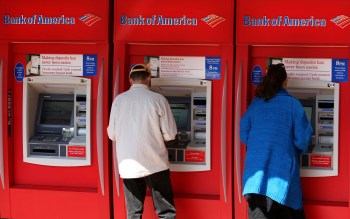Is the Fed becoming a state bank?
TEXT OF STORY
Steve Chiotakis: There are two important economic speeches going on today in D.C.
One, of course, is President Obama’s address before a joint session of Congress tonight. The other? Federal Reserve chairman Ben Bernanke. He’ll go to the Hill hours before Mr. Obama to talk about the economy. The Fed’s been pretty busy in the last six months. It’s made more than a trillion dollars in emergency loans to troubled financial markets and banks.
And more could come soon. That has some people gawking at its size. Our report this morning from Marketplace’s Steve Henn.
Steve Henn: In the 80’s, the Soviet Union had just one big bank for everything.
Simon Johnson: That was both the central bank and the provider of all commercial credit. They called it GOS bank or state bank.
Simon Johnson’s a professor of economics at the Massachusetts Institute of Technology:
Johnson: The Fed is becoming a kind of state bank. It’s kind of extraordinary.
Johnson says it feels like the Fed is reverse engineering a centrally planned economy. When the market for short-term loans to businesses collapsed, the Fed took over. When Fannie Mae and Freddie Mac had trouble selling their bonds, the Fed started buying. Soon, it will be propping up markets for credit card debts, auto loans, student loans and even loans to small businesses.
The reason is simple says Ken Kuttner, an economist at Williams College:
Ken Kuttner: There’s really no limit to what they can do, number one, and number two, they can do it quickly and without the need to go back to Congress for additional appropriations.
Kuttner and Johnson agree that while the Fed’s expanded role prevents the economy form falling apart even faster, there are downsides. If the Fed starts losing money, those losses get passed onto taxpayers. And Johnson believes the Fed’s actions just put off the day when policy makers in Washington realize some big banks need taking over or breaking up.
In Washington, I’m Steve Henn for Marketplace.
There’s a lot happening in the world. Through it all, Marketplace is here for you.
You rely on Marketplace to break down the world’s events and tell you how it affects you in a fact-based, approachable way. We rely on your financial support to keep making that possible.
Your donation today powers the independent journalism that you rely on. For just $5/month, you can help sustain Marketplace so we can keep reporting on the things that matter to you.


















